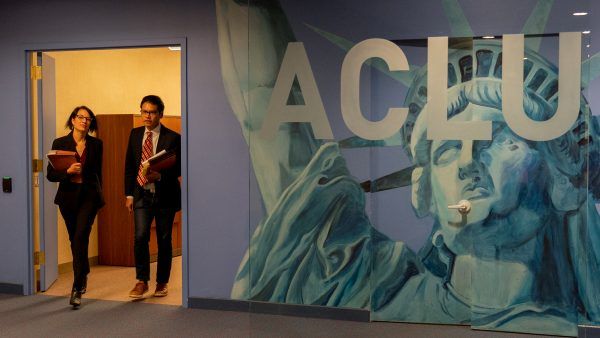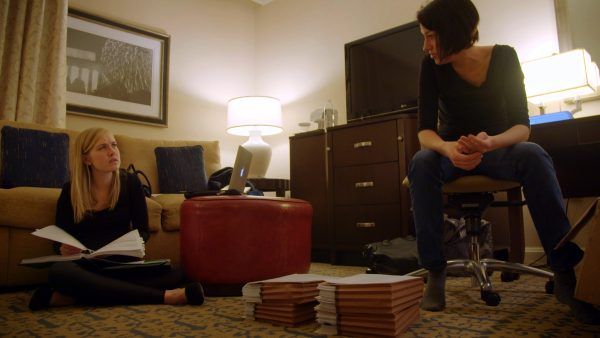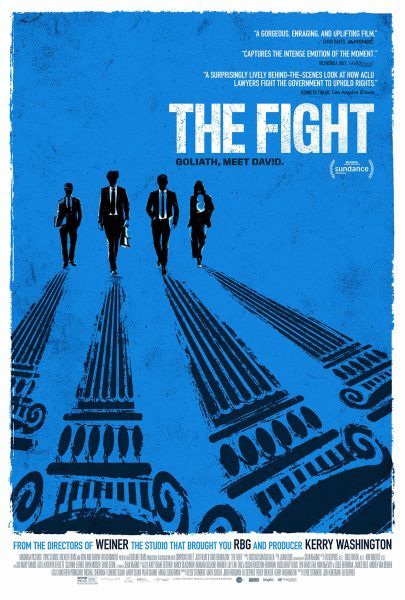Given the audience likely to see The Fight, I doubt Eli B. Despres, Josh Kriegman, and Elyse Steinberg’s documentary will change minds, and that’s okay. Not every political documentary should be judged on whether it’s a successful piece of agitprop. Instead, it’s better to view The Fight as a potent reminder of a mere glimpse of what America has endured over the past four years. Following just four of the 160 lawsuits the ACLU has filed since Donald Trump’s inauguration, The Fight shows how much the Trump Administration has attempted to obliterate civil liberties and shred the constitution in a way that would have been unusual for even a typical Republican administration (for example, it’s hard to see Jeb Bush or Ted Cruz trying to ban all transgendered service members in a tweet). While the documentary does provide glimpses of life at the ACLU, it functions best as a reminder of the stakes before November’s election.
The documentary chronicles four notable cases and the lawyers working them. There’s cis lawyer Joshua Block and trans lawyer Chase Stangio working on Stone v Trump, which is fighting against Trump’s transgender servicemembers ban; Bridgette Amiri works on Garza v Hargan, a case on whether a teenage undocumented immigrant, Jane Doe, could have an abortion while in the custody of the Office of Refugee Resettlement; Dale Ho is at work on Dept. of Commerce v New York, which is the fight over whether or not the Census Bureau can include a question about citizenship on the 2020 census; and Lee Gelernt is on the case of Ms. L v ICE, which is about family separation. While we watch these lawyers fight through the courts on their inevitable trip to the Supreme Court, we also see glimpses of life at the ACLU, why they’re not a monolithic organization, the hate they engender from the right-wing, and more.
At first glance, it’s easy to dismiss The Fight since it has a clear, left-wing stance (it’s pro-ACLU, obviously) and the Trump Administration is the antagonist in the argument. But I would counter that The Fight is necessary because the Trump Administration’s strategy is to throw unrelenting cruelty at the masses until we accept it through exhaustion. Be honest: of the four cases I just described, were you incredibly passionate about them when the news broke and then forgot about them because you had to move on to the next horrible thing? Again, if you’re a Trump supporter, this documentary was never going to be for you, but for the exhausted American who would like some semblance of normalcy and justice (it should be noted that none of these issues are ones where Trump has the advantage in polling; the majority of Americans never clamored for immigrant children to be ripped away from their parents), then The Fightserves as a splash of cold water on the stakes of the 2020 Presidential Election.
Oddly enough, where The Fight struggles is on the ACLU as an organization. Notable cases in its history are acknowledged in the opening credits, and from there we get a brief tour of the office, how the ACLU is divided into different civil liberty projects, and a glimpse at the work required that still feels slim. If you asked me how an ACLU lawyer works, my answer based on this documentary would be “They get a notification of some horrible thing the Trump Administration is doing, they hop on a train to Washington, they write a brief in a hotel room, and then they argue in front of a panel of judges.” And obviously there has to be more to it than that, and aside from some glances over client selection and specifying strategy over which arguments to make, we never get into the nitty-gritty of the ACLU’s work, which is disappointing since it makes the documentary feel more like a recruitment brochure than an in-depth look at how this prestigious organization functions.
Perhaps the best part of the documentary in explaining the ACLU’s mission is the segment on how the ACLU fought to get a permit for the Charlottesville protestors. The ACLU holds that civil liberties must be for everyone, not just those we agree with, and that this has been part of their history in fighting for repugnant organizations like neo-Nazis and the Ku Klux Klan. However, we also can’t ignore that in getting the Charlottesville protestors their permit, violence escalated to where Heather Heyer was murdered. Obviously, the ACLU wasn’t fighting for this outcome, and getting a look at their deliberations and seeing the dissent over who to fight for was a smart inclusion in the documentary. The ACLU doesn’t take every case, and when they take a case that leads to the death of an innocent young woman, do they bear some responsibility? The Fight has no easy answer to that question, and I’m glad that it doesn’t shy away from this controversy.
On the whole, The Fight depicts the ACLU as a benevolent organization, and their benefit to society is obvious when you see them crusading against something as morally abhorrent as family separation. The Fight may not change many minds, but it’s good enough to spur people to action and remind us that none of us can afford to sit on the sidelines when we have an autocratic Presidency with no regard for the Constitution or civil liberties. As Dale Ho cautions, the ACLU can’t change the tide or win the war. It’s going to take voters being involved to push for better policies.
Rating: B




